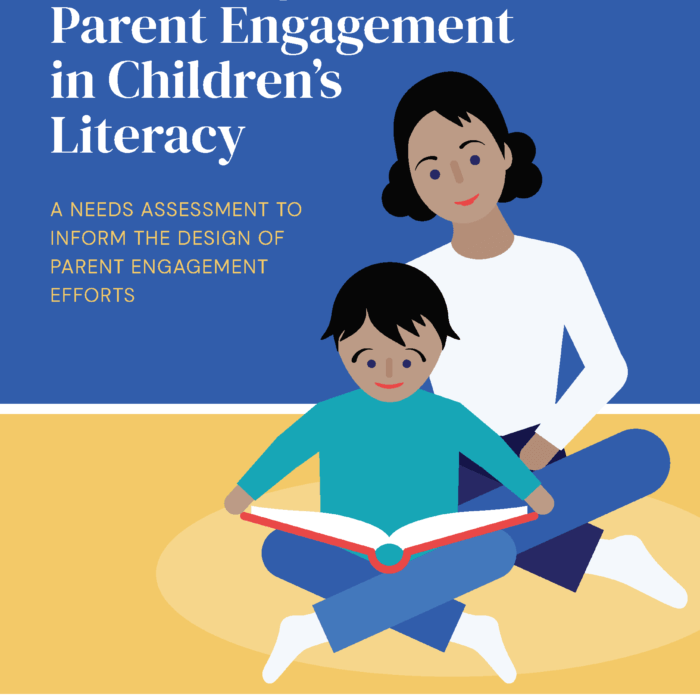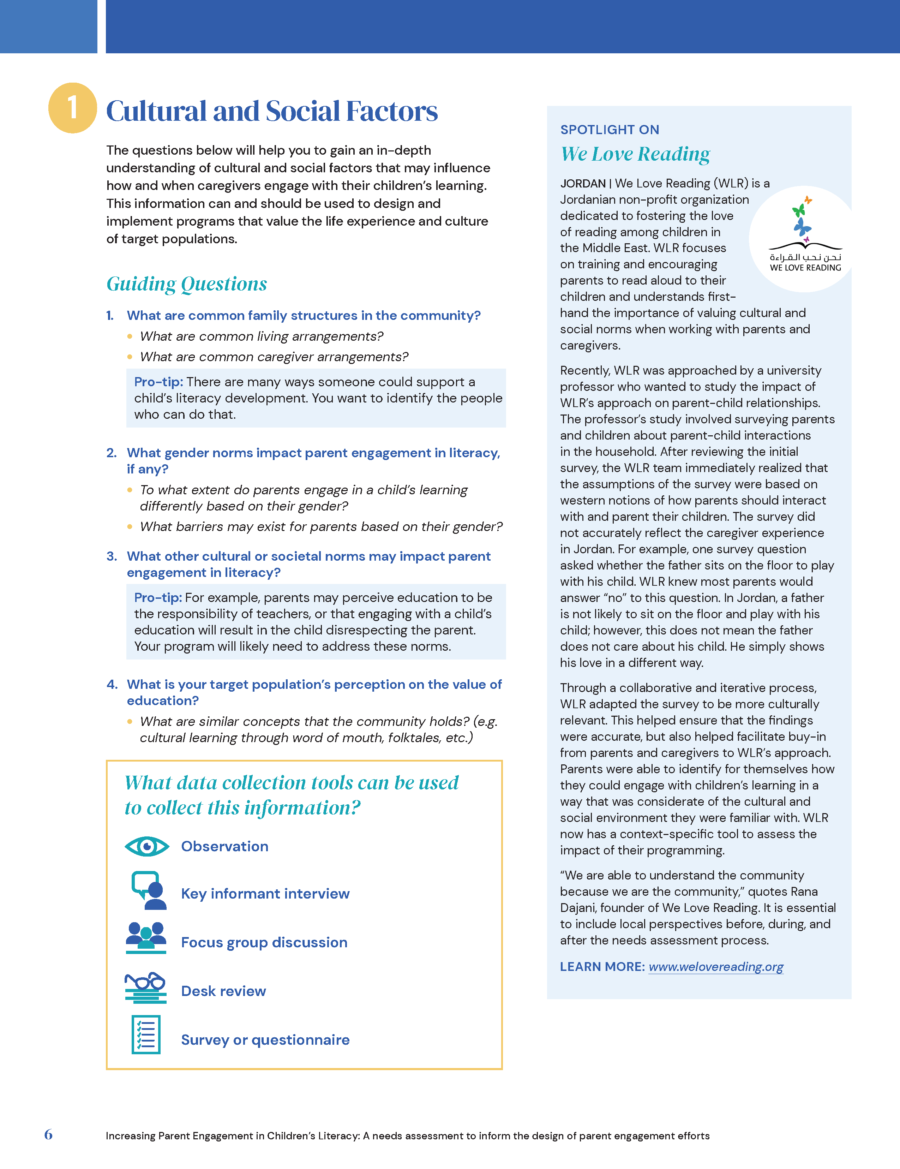A practical tool to increase parent engagement in children’s literacy
[Editor’s note: Two years ago, our team at R4D’s Center for Education Innovations began working with Pearson’s Project Literacy campaign to tap into the knowledge and experiences of literacy practitioners around the world. This blog is part of a series to launch tools and resources that were collaboratively developed with more than 100 literacy practitioners from over 20 countries to help literacy programs overcome shared challenges.]
Literacy is a foundational skill for success. People who struggle with literacy are more likely to live in poverty, have difficulty finding a job, and miss out on opportunities to participate fully in society. With approximately 1 in 10 youth globally still struggling to read and write, illiteracy is still a major challenge.
Research shows that positive parent engagement at home and in school can improve children’s literacy, but parents often need support engaging effectively in their children’s learning. In our literacy community of practice, many literacy practitioners spoke of struggles to fully empower parents, recognize household constraints, or overcome a general lack of parental enthusiasm and willingness to engage. Today, more than ever, as parents take on a greater role in their children’s education during school closures, literacy practitioners must act in close partnership with parents.
That’s why we created Increasing Parent Engagement in Children’s Literacy: A Needs Assessment to Inform the Design of Parent Engagement Efforts. This tool helps literacy practitioners deeply understand parental realities and co-design more informed parent engagement programs.
What is the needs assessment and who is it designed for?
Increasing Parent Engagement in Children’s Literacy is a practical guide intended to help literacy practitioners better understand the different factors influencing how and when parents engage with their children’s learning. Users of the guide can identify parental assets and gaps in the contexts where they work. This knowledge will then help them co-develop and implement tailored parent engagement programs that benefit both parents and children.
Created and piloted by literacy organizations, this unique evidence-based guide is infused with the experiences of literacy practitioners working in diverse country and cultural contexts with decades of experience engaging parents. It was developed for literacy practitioners who design, implement, and evaluate parent engagement programs, particularly those who engage low- or non-literate populations.
“Often, programs are developed FOR parents and caregivers but not WITH parents and caregivers. We envisioned this guide to be used by parents and practitioners to explore the meaning of parent engagement and its forms in the community, identify needs, challenges, and assets, and build strategies to support parent engagement in local communities. This guide is an invitation to embrace a participant-centered approach.”
– Catalina Gonzalez, Founder of Literacy4All and one of the co-creators of the needs assessment
A look inside…
The needs assessment is divided into a series of one-page questionnaires to guide users in assessing the broader literacy context, home learning environment, and caregiver experience in communities where they work.
Each questionnaire explores one of six topics and includes a short description of the topic, key questions and pro-tips from literacy practitioners, and recommended data collection methods. They include:
- Cultural and social factors
- Parents’ attitudes and beliefs about their role as a parent
- A household’s lifestyle patterns and daily routine
- The home learning environment
- A household’s use of technology and media consumption
- Parent and caregiver social networks
The guide also includes participatory tools, such as a community workshop facilitation template, to assist users in collecting information and co-designing programs in partnership with parents and communities.
Utility in a COVID context
The needs assessment was developed pre-COVID, but it is perhaps even more useful today as literacy practitioners support parents in taking on changing responsibilities in their children’s education. The questions contained in the guide are increasingly important for literacy and education practitioners to supplement their understanding of a new reality faced by parents. Parents’ attitudes and beliefs about their role as parents may have shifted, household lifestyle patterns and daily routines have changed for many, and there is greater opportunity to incorporate technology and social network support into parent engagement programs.
“Parents and caregivers with low-literacy and living in low-resourced communities are among the most affected by COVID. They also hold the key to strategies that work. COVID is an opportunity to engage parents in determining their needs and support them in designing strategies that work for them, their children, and other parents and caregivers in their communities. If 2020 has shown us anything, it is that creativity has no limits. We need to continue to use our imagination to reach these parents, engage them and support them.”
—Catalina Gonzalez
Users of the needs assessment may need to consider creative approaches to collecting data during COVID times. The guide suggests several data collection methods, which may be conducted using traditional in-person methods where proper precautions are taken. Where in-person data collection is not possible, virtual data collection methods may be used with guidance from tools such as the World Health Organization’s Tips for Engaging Communities during COVID-19 in Low-Resource Settings, Remotely and In-Person.
We hope this needs assessment helps practitioners surface new insights that help them better support and engage parents in children’s learning in COVID times and beyond.
***
Increasing Parent Engagement in Children’s Literacy: A Needs Assessment to Inform the Design of Parent Engagement Efforts is the third in a series of tools developed in close collaboration with literacy practitioners around the world. To learn more about the tool’s practical uses in the field, read the previous blog about Fabretto Children’s Foundation’s experience piloting the needs assessment.
The first two tools in the series — the Storytelling Roadmap and Literacy Measurement: A Holistic Framework — were designed to help literacy practitioners more effectively advocate for their work and create more holistic measurement strategies for literacy programs. Additional tools launching over the next month will be housed here.
Catch up on the series:
- “Tools and resources we created with 100+ literacy practitioners”
- “A practical tool to increase parent engagement in children’s literacy”
- “A teacher’s one-stop shop for localized literacy tools”















